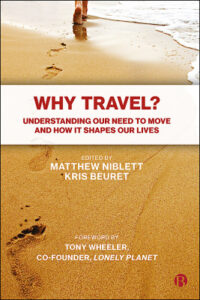Creatures of habit: Why do a third of Britons return every year to the same holiday destination?

Paris, France: the most returned-to destination of British holidaymakers. Others in the top ten are in Southern Europe and the US.
12th May 2016
Nearly a third of Britons (30%) return to the same holiday destination every year, according to a recent survey by ATOL,¹ and one in ten have already returned to the same place more than ten times. This habit has been dubbed ‘returnerism’ and is described by some in the industry as “an ‘illness’ in which UK holidaymakers… return to the same holiday destination year in year out.”²
That some view this travel habit as a bad thing – an illness – is linked to the way we think about travel. Often, travel is viewed as something involving change and novelty, and by extension as offering discovery, something educational, beneficial and somehow morally good, perhaps even spiritual. We sometimes talk of the benefits of experiencing a change of scenery or of experiencing a new culture – even changing or finding a new sense of self.
But this common narrative doesn’t appear to explain all our travel habits. The popularity of ‘returnerism’ shows that not all travel is undertaken with change and discovery in mind. Indeed, as Andy Cohen, Head of ATOL said: “Our research shows that many of us in the UK are creatures of habit who love the comfort of taking our well-earned summer breaks in familiar surroundings that we know inside out.” And even those who visit new destinations may choose resorts where they can eat foods from their home culture and enjoy familiar activities without engaging with local culture or language differences. Many tourists want a relaxing break from their daily lives but do not necessarily want to be challenged by too much novelty. This is a choice which can be influenced by personal circumstances, personality and social pressures and expectations.
These travel patterns are of great significance to the tourist industry, and understanding what motivates such behaviours is thus of crucial importance if we are to effectively manage and plan tourism in the future. The Independent Transport Commission has set up the Why Travel? project with the aim of better understanding travel motivations within tourism and more broadly, encompassing daily travel and other human movement. The project looks at ‘internal’ psychological and biological drivers as well as the economic, cultural and social structures we have created that all enable, control and shape our travel behaviour. The ultimate goal is that this deeper understanding will help us to make better decisions in future regarding human travel and transport, and the myriad areas of human life which travel touches on. For more information of the project, including news and expert views, see www.whytravel.org.
¹ Survey of 2,000 UK adults who holiday abroad conducted by Mortar on behalf of ATOL (a customer protection scheme run by the Civil Aviation Authority) in February 2016.
² https://www.caa.co.uk/News/Holiday-habits—returnerism–widespread-among-UK-holidaymakers/


